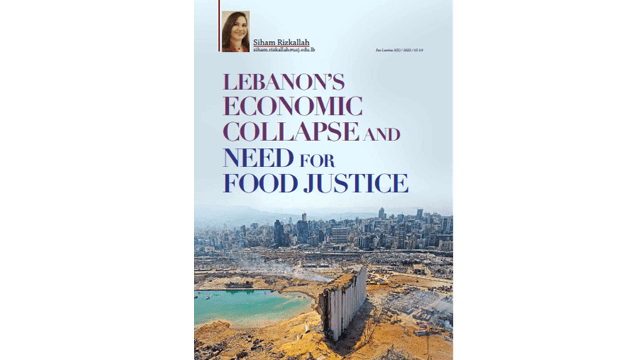Lebanon’s economic collapse and need for food justice
Actually, Lebanon is facing one of the most severe socio-economic collapse which led to a dramatically food insecurity for both Lebanese population and thousands of refugees living in Lebanon. Lebanon was already suffering from the economic recession compounded by the COVID-19 pandemic, when a devastating blast hit the capital’s port on 4 August 2020, than the war in Ukraine came to increase the inflationary pressures which started to be reflected in many economic indicators showing the gravity of the multidimensional crisis on food and living security in Lebanon.. That’s why we found it crucial to explain the main reasons and repercussions of the economic collapse in Lebanon, to present its main determinants indicators and to measures their impact combined to the additional challenges on the level of food needs and international initiatives to enhance food security for the country of cedars.. Three main pillars allow us to detect the fundamentals of this collapse :
1) The involvement of the banking system in the financing of the public sector;
2) The ratchet effect of dollarization since the currency crisis of the 1980s;
3) The maintaining of the unconventional exchange rate the peg to one currency adopted since 1997 despite an accumulation of balance of payments deficits since 2011.
The food injustice in Lebanon, is not only related to the food lack because of inflation and depreciation (especially that 80% of Lebanon consumption is imported and paid in foreign currencies) but also it is linked to food loss and food waste. Currently, the local and international initiatives undertaken are certainly promising to ensure the necessary minimum of food security, however the radical solution remains in the realization of the economic reforms essential to revive the economy of Lebanon to leave the circle of assistance and resume the path of growth in order to be able to satisfy its needs.
Siham Rizkallah est Maître de conférences à la Faculté des sciences économiques (FSE) de l’USJ. Elle détient une Licence en sciences économiques (2000), une Maîtrise (2001) et un Diplôme d’études spécialisées en politique économique (2003) de la FSE ainsi qu’un Doctorat en sciences économiques de l’Université Paris Sud (2007).

Commentaires0
Veuillez vous connecter pour lire ou ajouter un commentaire
Articles suggérés


